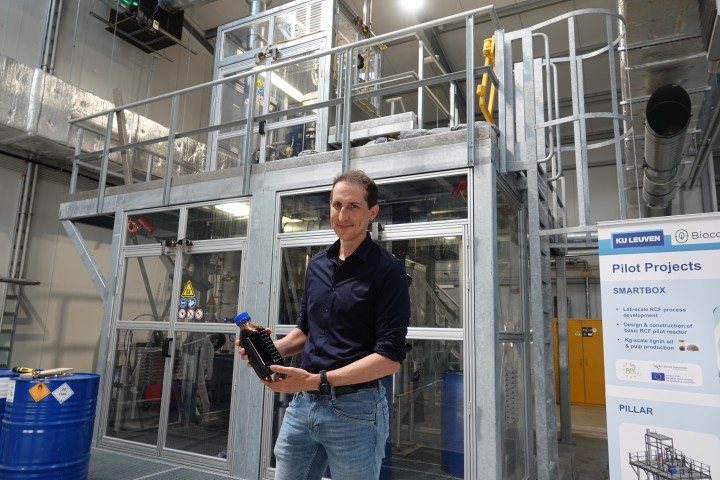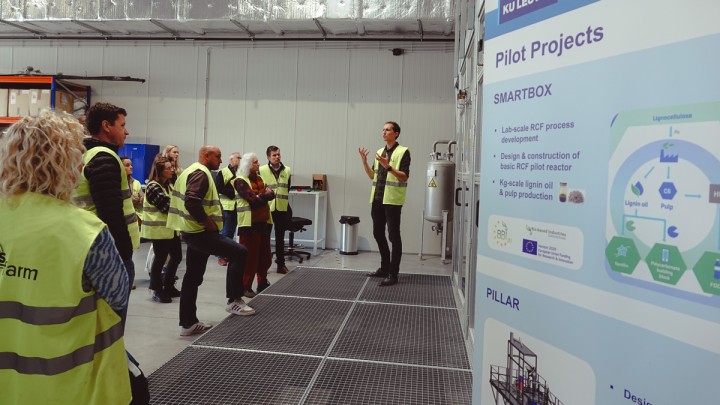“There is no shortage of companies asking for lignin-samples from our pilot reactor”
In the search for alternatives to fossil raw materials, researchers at KU Leuven are using plant residues to develop bio-based chemicals. They opened a pilot facility “Biocon” late last year to prepare the technology for industrial use. Meanwhile, that industrial interest includes a collaboration with Total Energies. The Biocon pilot facility came about in part thanks to Moonshot as part of the later stage innovation (LSI) project Pillar. We spoke with Biocon manager Sander Van den Bosch to find out how the industrial scale-up can come about.

Since this year, the Biocon pilot plant is producing high-quality lignin on a kilogram scale that can be used in chemical applications. An important milestone. Further applications are also being developed for the pulp, the second product that remains after lignin production.
Sander Van den Bosch: “Yes, it’s really unique that we are producing this quality of lignin oil on this scale. Most lignin’s are insoluble powders but our lignin oil is highly soluble and allows a much broader application platform, closer to today’s fossil phenol markets. So the application areas are very broad (ed. Adhesives, coatings, foams, surfactants, bioactive compounds, , biofuels or even drop-in chemical compounds like phenol itself)
Companies can follow two tracks in bringing bio-based molecules into use: either as a drop-in with the identical chemical structure as it’s fossil analogue. Or, as a new biobased ingredient for existing products. The latter typically requires some development to meet current product specifications, and creates opportunities for new or improved product properties , for example to pursue higher safety.
So how can a company approach Biocon? Do companies just need to request a sample?
Sander Van den Bosch: “Many companies come and request samples, we have no shortage of them (laughs). However, a simple sample sales is not our preference. For us, it is important that we can cooperate with the companies in question: we want to understand whether our biobased intermediates generate favorable results in their product tests. After all, to bring the technology to industry, process development and market creation need to go hand in hand. Thanks to the Tech Transfer Office of KU Leuven, we have a number of formats for collaboration that we can immediately present to interested companies depending on their position in the value chain and level of commitment.”
How do you want to be able to track exactly what companies are doing with your samples?
Sander Van den Bosch: “We don't need to know every detail. We do want to know if something succeeds or fails, if they are interested in scaling up, and if we can improve something about our process to provide them with even better samples. So this means that we are aiming for a development in both directions: that companies can test our products extensively and we can learn to make even more focused products.”
“Our focus remains to further develop our biorefinery process. We keep that IP central to support future licensing to a technology development company who can further scale up from pilot to industrial scale.. Downstream, companies can strengthen their own IP portfolio on the product side. We ensure a market for our intermediates and they protect their novel biobased products. That is a clear win-win vision that we advocate.”
The shift to biobased
The shift to biobased product development is in full swing. Does this help generate interest from companies?
Sander Van den Bosch: “Yes, it feels like we are able to surf on a bigger wave. This would have been much more difficult 20 years ago. There are examples where the technological solution was ready, but the market was not. That market is more and more starting to get there and the government is playing a key role in accelerating this process. We find that this is a main driver of companies to come to us.
With that, cost also comes into play. Using the lignin will not be feasible for every application. Do you already have a perspective on that?
Sander Van den Bosch: “Over the last 3-4 years, we have been putting our entire process on an industrial scale into computer simulation. This gives us more insight on the main cost drivers. By constantly adjusting and improving the process and validating the model with experiments we have been able to drastically reduce our cost. An exercise that is ongoing. Today, we can get into a price ranges comparable to petrochemicals like phenol and bisphenol. A minimum selling price below 1000 euros per ton is feasible, and based on industry feedback compatible with large product markets. The challenges lie more in large-scale production, ensuring that the biorefinery process is scalable and ensuring a good market fit by consistently meeting product quality requirements . On the economic component, this innovation will not get stuck.”
Another issue with scaling up is organic feedstock. Do you also need to get this organized?
Sander Van den Bosch: “That is definitely a challenge and we don’t take it lightly. We have been studying the amount of woody streams from forestry in Europe. What have we found: the residual streams of wood that are used for energy today are in theory sufficient to supply the chemical industry. At least if we are talking about chemicals and chemical production. If you also wanted to use it to produce all of our fuels, it is not feasible. In practice, such a one-to-one substitution between energy and chemistry will not happen; it is part of a broader transition, but it gives an indication that the amounts are there.”
“Another point around feedstock: we believe it's important for novel biorefinery processes to focus on feedstock flexibility. With the upcoming “fight” for renewable carbon, you can't bet everything on a yearlong steady inflow of material of identical quality. There is a parallel with petrochemicals in that regard. Not all petroleum is identical. Petrorefineries have learned to adapt to that as well, both logistically as technologically. With biorefineries, something similar will likely also be needed. ”

Exploration with crops
You work, not only on woody streams from forestry, but also on agricultural side streams?
Sander Van den Bosch: “Our role is to see if we can convert hemp into a raw material for the chemical industry. Those two crops can make these part of a system of crop rotation and thus become part of a production process in chemistry. We already know this works with hemp and succesfully tested that on a larger scale as part of the CropExplore for Farmers project with Flanders’ FOOD and Catalisti.”
What role did Moonshot play for Biocon?
Sander Van den Bosch: “A big role! Bringing chemical innovations from lab to industry requires multiple scale-up steps, high risks and large investments. With each step you take the risk is reduced. After the lab-scale there is a notorious valley of dead, where industry often finds it to risky to invest. This is exactly where Moonshot stepped in, advancing the technology from lab to pilot scale to derisk the technology after which industry can take over.
How can Biocon continue to address industry needs once the lignin train has left?
Sander Van den Bosch: “As a university pilot facility we are less tied to one technology or business plan, so we design our equipment as flexibly as possible. Companies and university partners will be able to exploit this new chemical pilot facility in Flanders to test other innovations. In the longer term, we want to evolve with Biocon toward a platform for collaboration and open innovation.”